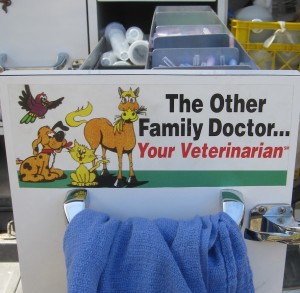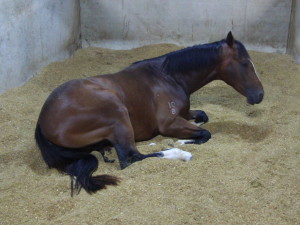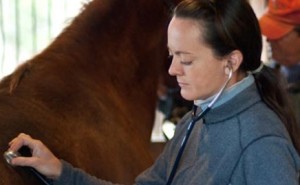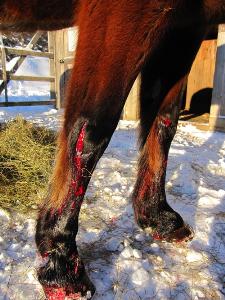By Maddy Butcher
You buy a horse.
In these days of Instant Gratification, it can be as simple as that. No one will stop you.
But do you deserve it?
Three professionals recently weighed in on what they say is the distinct privilege of horse ownership. Here, they discuss the crucial elements required before you bring home this big, yet fragile animal.
In brief, you need space, money, smarts, and a learn-aholic attitude.
Space:
Ideally, one should have between one to two acres per horse. Space allows the horse to move, a necessity for its digestion, physiology, and overall well-being.
Research continues to show that stalling and isolating horses invites a myriad of problems: social, behavioral, hoof-related, colic-related,
and more.
“What the hell are you doing putting your horse in a 10 x 10 stall?” asked Dr. Rebecca Gimenez, president of Technical Large Animal Emergency Rescue. “That cannot be your plan.”
If you do have limited space (say, a 100 x 100 feet), manure management is essential in order to limit to your horses’ exposure to parasites. In other words, small paddocks need to be picked clean daily. Horses should not eat and poop in the same space.
“There is a health benefit to having more land,” said Dr. Kate Schoenhals, of South Mountain Equine in Bluffdale, Utah.
Smarts:
One should have at least a rudimentary education in the nutrition, handling, wellness, as well as emergency care and procedures.
- Can you identify colic symptoms?
- Can you take your horse’s temperature, pulse and respiration rate?
- Can you make seasonal and weather-related adjustments to routines as your horse’s needs change?
Anything but a confident “Yes” to these questions indicates you’re not ready to own a horse.
“I wish there was a Gold Standard for education,” said Dr. Schoenhals, referring to a level of aptitude owners should acquire before bringing horses home.
Many of us learn from our family, friends, and mentors. There are also more formal options including 4H, Pony Club, equine science programs, and vet tech programs.
“Your responsibilities extend beyond providing food and water,” said Gimenez, who has a PhD in animal physiolody. “Continuing education is important. I still read horse resources.”
Don’t be afraid to ask questions.
“I really enjoy clients who want to be educated,” said Dr. Rachel Flaherty, owner of Back Cove Equine Veterinary Care.
But be wary of using the Internet to style your own education and as a perpetual Do It Yourself resource.
“It’s a dangerous and very useful tool,” said Schoenhals, who recalled a client wanting to inject a horse’s tumor with the aromatic resin, frankincense. “I actually appreciate the people who over-call. I’d rather that than not call because they’re not sure.”
Money:
Be prepared to open your wallet.
Estimates vary, but unless you have several thousand dollars to spend per horse per year, leave horse ownership to others. As much as we might like to think so, this is NOT an Equal Opportunity arena.
“I like to tell people they’re going to spend $5,000 for your first horse in that first year,” said Gimenez. “It doesn’t matter if that horse is at home or being boarded.”
Typical preventive care, including vaccinations, dental care, farrier work, fecal egg counts paired with possible worming, can total more than $500 per horse annually.
 If your horse needs hay year-round, it’ll cost another $900 or more.
If your horse needs hay year-round, it’ll cost another $900 or more.
On top of that, it’s a good idea to set aside a set amount for emergencies, at least $1,500 per horse, say the experts.
“Talking about the “what if’s” is a great thing to do,” said Flaherty. “Then you’re not making decisions in the moment, when you’re freaking out and emotional.
Most agree that acquiring and breeding equines need to be considered responsibilities for the long haul.
“It should be a commitment for a lifetime,” said Schoenhals.
As your horses age, added Flaherty, consider its aging wellness and end of life plan. “Start thinking about things as the horse gets older. Get the plan going.”




Thank you for having the guts to publish this. Some horse owners want to take the time to learn new things, others seem to think that they already know it all. A “lifetime committment” is exactly right – to learning, to growing, and to keep that horse until it dies.
I like that you mentioned having funds set aside for emergencies because they will happen. You want to be prepared with a vet and with money to pay for it. I would also learn how to handle some emergency situations so you don’t panic when they happen.
Great points, Kenneth. Thanks for your input.
AMEN! Sharing…..
Thanks for a great article, Maddy. It is truly an honor and a privilege to be so fortunate to have a horse or horses in ones life. Your opening sentences point out a major flaw in the equine industry. Almost all horse sellers, of any level and reputation, will sell a horse to anybody willing to pay the designated price. This speaks not only of the ‘instant gratification’ problem, but also the pervasive sense of entitlement and the prioritization of money in these, and all, choices and decisions. There is rarely an effort made to make sure the ‘fit’ is correct, especially when the wallet is fat. I’m not sure about your statement that a person is not ready for horse ownership if they can’t do your list of three requirements. This implies that the best way to start with horse ownership is to keep your horse at home, and I disagree with that. Nor do I believe that if the answer is ‘yes’ to those questions, a person is necessarily ready to provide adequate dominion over horses kept at home. A logical step-wise approach to horse ownership might suggest that a person begin with legitimate, structured, regular instruction from a credentialed mentor at a suitable riding facility. If that goes well and interest and commitment grows, a next good step could be to lease (or even possibly buy) an appropriate horse that can be kept at a well-managed facility where mentorship and instruction can continue. One helpful way to learn to identify what wrong looks like is to begin with having what correct looks burned into our brains. So many things that back-yard, beginner (sometimes beginners for 20-30-50 years) horse owners think are just ‘things that horses do’ are avoidable and unnecessary. And definitely NOT things that secure, confident and healthy horses do. Finally, if a person is busy with other aspects of their lives and are fitting the horses into the cracks where it’s convenient for the human component, it may NEVER be appropriate to have the horses ‘at home’. Just because an individual has enough land, enough money, even enough knowledge to own horses, if they don’t have enough time, any true horseman would agree that it’s better to have them in a well-managed environment where care (including exercise) is consistent. Thanks again for a thought-provoking and well-intentioned article!
Okay…I’ve been mulling over this article. I’ve shared it on social media and was saying “yes” throughout reading it. But it has dawned on me that I’m being hypocritical. I didn’t know it all before owning my first horse, I wasn’t fully prepared with all kinds of money in a savings account, I was undereducated (compared to where I am now) in all things horse. BUT I had commitment. I had a desire to learn more. I was a horse lover ever since I can remember, but that didn’t fully prepare me for ownership. It didn’t stop me from buying a horse and I’m not sure I can fully support telling others they shouldn’t buy a horse. But what I can ask others is what is their commitment level. I worked with an equine welfare group in Maine and I even fostered a state seized horse from a very difficult situation. Should everyone own a horse…no. Should those that really desire a horse, backed up by commitment, buy a horse…yes! I know I wouldn’t know all my wonderful horse friends if I never owned a horse…and I wouldn’t want to give up any of those relationships. I wouldn’t be the person I am today without owning horses, making mistakes, learning new things, and being committed to my horses’ end of life. In the end, most people reached by articles from Best Horse Practices are horse folks who want to learn more. So let’s help others to learn more, to be a more informed horse owner, and maybe mentor a horse-lover from birth just waiting for their “perfect” first horse.
Whew…..sorry for the rant….the things I end up mulling over while taking care of my horses! In the end, I can say “thank you” for the article because we should all be thinking about the welfare of the horse and this article brought out a great discussion.
Great point, Julie. And I think your comment serves readers well. Thanks for giving it some thought and being sincere. Much appreciated!
Learn-aholic attitude. Love this descriptor, it is spot on.
This article brings up many good & relevant things to consider. There are many creative ways to create a stimulating & healthy horse environment on a smaller property. I’ve designed quite a few. First you must ask yourself – Is the well being of my horses a top priority? Am I willing to give up some of what I might want to make a better environment for them? Smaller properties can benefit from fewer buildings (skip that fancy barn – barns are for humans) & go with several run in sheds – big enough for the size & type of your horses. (( Consider an “L shed” (a back wall, roof & one end wall. It’s more open, better ventilation & allows for more room for 2 horses. Create “tracks” around your entire available property with multiple feeding & watering stations, including hanging snacks on fences & from trees. Create several comfortable rolling & lie down spots. If you need an arena or riding space incorporate that as part of your turnout. If you can have grass, make your arena grass with a footed riding track around the perimeter. Do everything you can to encourage movement & socialization. If you can only have one horse goats, burros or donkeys make great companions. If you are boarding seek out a boarding stable that emphasizes natural practices – turnout, socialization, grazing or slow feeding options. Drive farther if you have to for a better boarding situation. And yes plan to spend money, quite a bit of money. Horses just aren’t cheap & with the loss of farming/agricultural land plus climate change they are getting more & more expensive. A great resource for innovative, natural horsekeeping is Jamie Jackson’s book “Paddock Paradis”. Don’t forget your most valuable resource in creating a great life for your horse – you & your time spent!